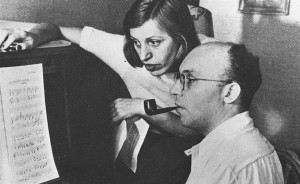Kurt Weill was one of a kind. Classically trained, he was, according to the Groves Dictionary of Music and Musicians, “one of the outstanding composers in the generation that came to maturity after World War I, and a key figure in the development of modern forms of musical theatre.” In Germany in the 20s and 30s, Weill was acknowledged to be the most gifted composer after Hindemith, and with a much better sense of theatre. Not to take him seriously as a significant 20th century musical figure is a mistake.
Weill developed an authentic musical style that combines classical music with jazz and dance elements in such a way as to make his music instantly recognizable. His skill in setting texts to music is unparalleled. During his collaboration with Bertolt Brecht, and later on Broadway, he had a genius for allowing a text and its meaning to shine at full brilliance while never diminishing the strength of his music.
Brecht and Weill’s first major triumph was ‘The Threepenny Opera‘, a work that demonstrated their desire to write meaningful, socially-engaged works that both impressed intellectuals and were also meant for a broader public. Weill was anti-elitist, but at the same time delivered works of significant musical substance, full of inventiveness and originality.
That his path was formed largely by world events is clear. How his musical development would have been different had he not had to leave Germany and emigrate to the United States is open to speculation. What is clear, however, is that the body of works left to us by Kurt Weill is studded with gems that delight all music lovers – whether their preference be for classical music, jazz or music theatre.


Post a Comment